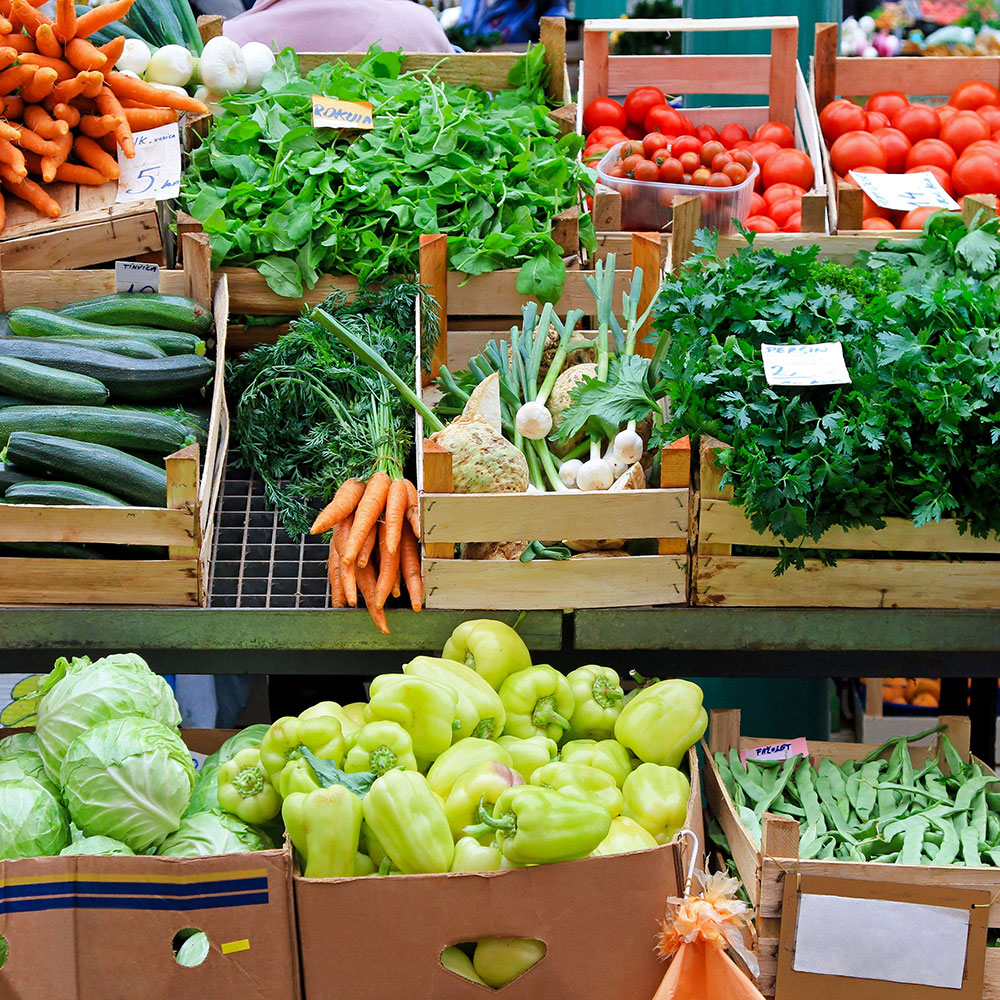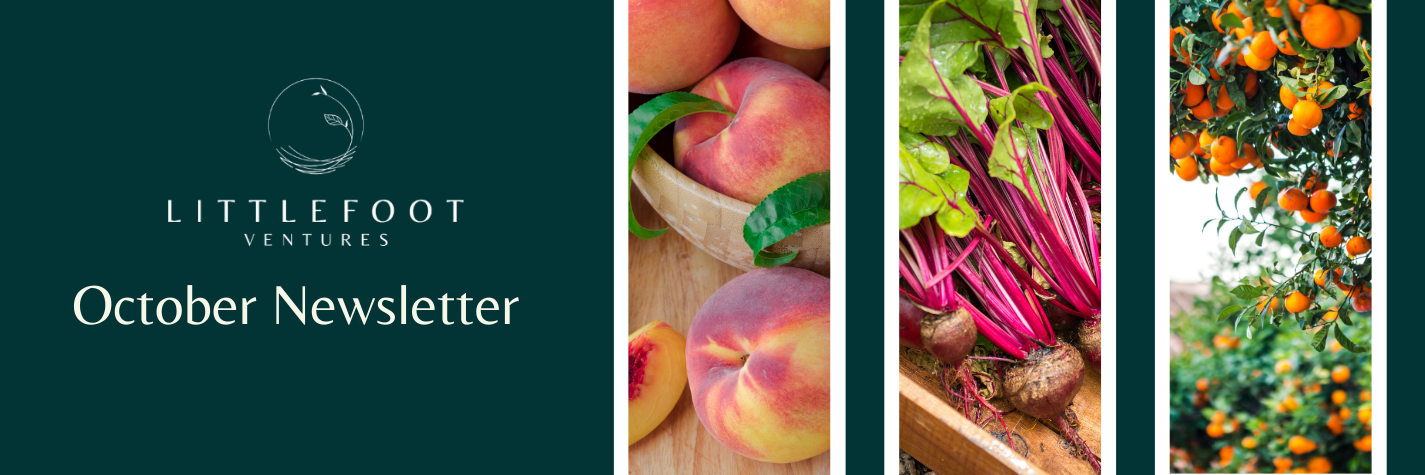Dear Colleagues,
This month, I’ve been deeply moved by the tangible impact Littlefoot is driving as we push forward in creating meaningful systems change. Read on for a snapshot of some inspiring client achievements. I’m also grateful to have received an award for being the most influential CEO by CEO monthly, but most importantly, I’m excited about some policy wins we saw this month including California becoming the first state in the nation to require clear standards to cut food waste through their new date labeling law, and a recent Congressional briefing that I had the privilege of attending.
-
Blue stripes: Congratulations to cacao industry pioneer Blue Stripes for closing a $20M investment round led by Whole Foods and Hershey’s. I’m honored to have been a small part of their journey and look forward to seeing Blue Stripes continue setting new standards in sustainable cacao through upcycling.
-
Matriark Foods: I’m thrilled to share that Matriark Foods has been recognized with the 2024 Meaningful Business 100 Award—a testament to their commitment to impactful change.
We’re proud to celebrate these milestones and the progress toward a more sustainable future!

Some exciting things I’ve been up to:
-
Congressional briefing: I got to join City Harvest, The National Restaurant Association, The Global Cold Chain Alliance, the USDA, Patelana Group, Food Systems Collaborative, and the Food Recovery Network for a panel on Capitol Hill that was focused on Bipartisan Solutions to end Hunger and Food Waste. The goal of the event was to inspire congressional staffers to take action on food recovery by joining the House Food Recovery Caucus.
-
RFSI: I had the pleasure of hosting a workshop at the Regenerative Food Systems Investment Forum with my General Partner at Farmhand Ventures, Connie Bowen. You can read more about the case study we developed here. A few key takeaways from the Forum:
-
Beyond Sustainability: Regenerative agriculture doesn’t just sustain — it actively rejuvenates and enhances natural resources, creating a net-positive impact on ecosystems.
-
Guarding Against Greenwashing: As regenerative agriculture gains traction, it’s crucial to protect its integrity against superficial branding that dilutes its powerful climate potential.
-
Honoring Time-Tested Wisdom: True regenerative practices are rooted in principles that value the land, support farmers, and prioritize environmental healing — wisdom passed down through generations.
-
Cross-Sector Partnerships Are Key: Scaling regenerative agriculture requires partnerships across farming, investment, and policy, ensuring that not one single entity shoulders the challenge alone.
-
Innovative Financing for Sustainable Growth: Blending public, philanthropic, and private investments can de-risk regenerative projects, making them more appealing and viable for long-term investors.
-
A New Investor Mindset: Traditional VCs must look beyond short-term profits, focusing instead on long-term environmental and societal returns to truly unlock regenerative agriculture’s promise.
-
-
New Podcast: I recorded a podcast with Silver Maple Strategies on the Secrets of Social Impact Communicators. We talked about why purpose-driven and climate-focused leaders need to boost their capabilities in messaging about climate change, and the power of story to open people’s hearts.
As always, I want to hear what’s going on in your world and how I can support you. Yours in partnership,
Founder & CEO
What Our Team Is Reading
Source: What If We Get It Right, Book by Dr. Ayana Elizabeth Johnson
Bloomberg Philanthropies Launches Its Largest Mayors Challenge Ever to Inspire City Leaders Globally – The Chronicle of Philanthropy
Bloomberg Philanthropies launched its largest Global Mayors Challenge to date, offering $50,000 to 50 cities worldwide to refine their innovative ideas to transform urban services. They also recognized the city of Rourkela, India, for its innovative approach to reducing food waste and increasing farmers’ incomes. The city’s winning project provided solar-powered cold storage units, making it affordable for small farmers to store perishable produce, reducing spoilage, and boosting sales. This led to a significant decrease in produce waste and a 25% increase in farmers’ revenues. Rourkela is an example that other cities in India are beginning to replicate.
Survey finds Gen Z hungry for transparency in food sustainability – The Packer
A recent survey reveals that Gen Z consumers prioritize transparency in food sustainability and are willing to pay more for environmentally responsible and high-quality products. Around 70% of them support climate-smart agricultural practices, and they are increasingly interested in knowing how their food is produced. Many also expect clearer communication from brands to make informed choices, highlighting the opportunity for brands to strengthen their sustainability messaging and transparency to build trust and loyalty among this environmentally conscious generation.
Local Food or Scalable Solutions? – Medium
Katie Macc reflects on her family’s local food challenge (only buying and eating food that was raised, grown, produced, and sold within their state). She reveals the complexities and benefits of sourcing food directly from nearby farms. Despite the logistical challenges, the connection to local agriculture and the improved taste and nutrition of the produce stood out. The experience raised larger questions about the viability of scaling local, nutrient-dense, and regenerative farming to address widespread issues in the current food system and revealed that, while the local food approach offers clear benefits in terms of nutrition, taste, and environmental connection, it is often inaccessible for many due to cost, time, and geographic constraints.
Beyond Clean Tech: Why Food Systems Deserve a Bigger Slice of the Climate Funding Pie – Medium
While clean technology receives significant attention in climate funding, food systems remain underfunded despite their major role in emissions and potential for environmental impact. Food systems contribute nearly one-third of greenhouse gas emissions globally, yet they receive less than 4% of climate funding. This article highlights that shifting more investment towards sustainable agriculture and food systems could help address climate goals by reducing emissions and supporting biodiversity, and advocates for systemic funding to drive such transformations effectively across production, distribution, and consumption processes.
Uneaten Food Is Responsible for 14 Percent of U.S. Methane Emissions, According to New ReFED Study – ReFED
A new ReFED study reports that nearly 14% of U.S. methane emissions stem from uneaten food, a volume that is equivalent to emissions from 75 million cars. This methane arises from both food production (notably beef and dairy) and waste management, such as landfills. To address this, the study suggests reducing food waste, establishing organics diversion infrastructure like composting, and incentivizing businesses to adopt waste prevention practices, which could significantly cut methane emissions and aid in slowing climate change.
Hershey’s, Nick DiGiovanni Part of $20M Investment for Startup Making Upcycled Cacao Products – Green Queen Media
Blue Stripes, one of Littlefoot’s former clients, has secured $20M in funding from investors including The Hershey Company, Whole Foods Market, and chef Nick DiGiovanni. Read this article if you want to learn more about how Blue Stripes addresses the chocolate industry’s environmental impact by tackling the industry’s waste and creating delicious upcycled products. With this investment, Blue Stripes is hoping to expand its sustainable cacao products and continue working towards mainstreaming the use of the entire cacao fruit for greater sustainability.
An Alarming Decline in the Nutritional Quality of Foods: The Biggest Challenge for Future Generations’ Health – National Library of Medicine
The article highlights the significant decline in the nutritional quality of food over the past 60 years as a result of modern agricultural practices, such as the use of synthetic fertilizers and high-yield crop varieties, which have led to nutrient-depleted soils and foods. This worrying trend could exacerbate health issues like malnutrition and chronic diseases. To address this, the authors advocate for improving soil health, promoting nutrient-dense traditional foods, and adopting sustainable farming practices such as regenerative agriculture.
Food Is What We Have In Common. Why Don’t We Hear More From the Candidates About It? – The New York Times
Food has become a topic in the U.S. presidential campaign with Kamala Harris and Donald Trump addressing it from different angles. The article suggests that Trump has focused on removing “toxic chemicals” from the food supply and environment while Harris is encouraged to take a more holistic approach by promoting access to nutritious food, supporting small farmers, advocating for sustainable practices, and tackling food industry consolidation.
The Climate Fix: Solutions for a Warming World – The New York Times
The New York Times has introduced a new feature called “The Climate Fix” which highlights solutions to climate change. It showcases global progress toward a cleaner future, presenting initiatives like the Tropical Forests Forever Facility (T.F.F.F.) which is raising $125 billion to pay developing countries for protecting tropical forests. Though significant obstacles such as securing investments, regulatory hurdles, and cost-effectiveness remain, the efforts highlighted by this series illustrate a broader movement toward innovative climate strategies.
4 ways tech innovators can improve investor engagement – World Economic Forum
Venture-backed companies often face challenges when it comes to engaging investors. This article outlines four strategies through which tech innovators can enhance investor engagement and better convey the value of their technology, attract the right investment, and stand out in a competitive market. Building strong relationships with investors, crafting a clear and compelling elevator pitch, learning from competitors’ communication strategies, and seeking investors with specific industry expertise are crucial for securing funding and scaling innovations effectively.
Book: What If We Get It Right? Visions of Climate Futures – Dr. Ayana Elizabeth Johnson
Dr. Anya Elizabeth Johnson explores the possibilities of a future where humanity successfully addresses the climate crisis. It combines expert insights and storytelling to envision a world where social, economic, and environmental progress align, offering hope amidst the challenges of climate change.
Podcast: Growing A Better Food System – Where The Internet Lives
In this new podcast episode by Where The Internet Lives, guest speakers including Emily Ma from REWS sustainability at Google, Stephanie Zidek from Feeding America, and others, discuss data-driven predictive tools that are helping farmers use less water and improve yields, and how data and AI are getting excess food to those who need it most.
Upcoming Events
-
- October 28 – 30 | San Francisco, CA | SOCAP
- October 29 – 31 | San Jose, CA | GreenBiz VERGE
- November 1 | Stanford, CT | 2024 Stanford Food Summit
- November 11 – 22 | Baku, Azerbaijan | COP29
- November 14 | London | Lineage Food Chain Innovation Challenge 2024
- November 19 | San Francisco & Amsterdam | Lineage Food Chain Innovation Challenge 2024
- November 20 – 21 | Minneapolis, MN | Sustainable Agriculture Summit
- December 10 | Virtual | Regenerative Food Systems Investment Canada
- January 20 – 24 | Davos, Switzerland | World Economic Forum Annual Meeting
- January 22 – 23 | San Francisco, CA | Sustainable Foods Summit North America
- March 7 – 15 | Austin, TX | SXSW
- May 5 – 8 | Las Vegas, NV | 10th Annual Food Recovery Forum and Organics Recycling Conference
- June 23 – 25 | Seattle, WA | ReFED Food Waste Solutions Summit



